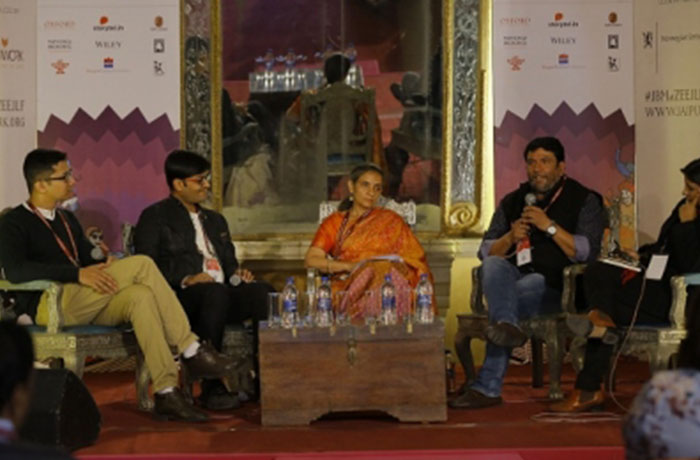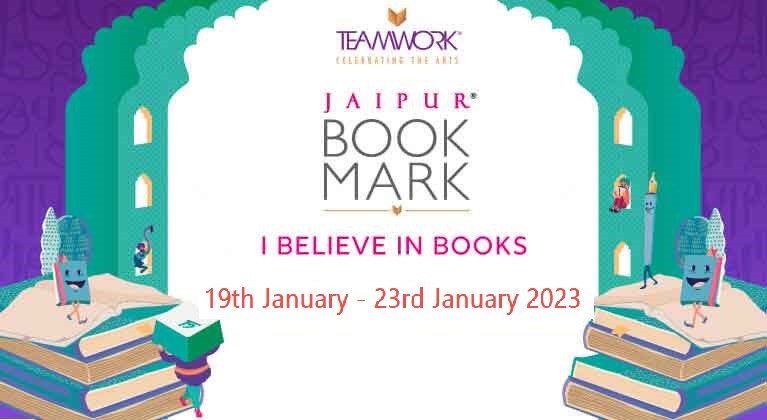
Books That Speak: The Future Of Audio
Yogesh Dashrath, Arcopol Chaudhuri, Himanshu Giri and Aditi Maheshwari Goyal in conversation with Mita Kapur
Ishan Kawley, Official Zee Jaipur Literature Festival Blogger
You walk into any high-end gym today and all the treadmills come equipped with a socket to plug in your phone. You can watch videos, tweet, check your email, all the while burning calories. So perhaps it was only a matter of time before books also molded themselves into a form that catered to today’s tech savvy multi-tasking readers. Welcome audio books, aptly introduced by moderator Mita Kapur as “a sweet spot between changing technology and changing behaviour.”
The discussion kickstarted with Harish Giri, CEO of Pratham Books, a non-profit that promotes reading among children. He claimed that irrespective of format, content is still key, observing how imperative it is to create content that actively engages children. Giri described Pratham’s foray into audio books, elaborating on the pilot project they conducted across five states of India. Their mobile-enabled audio book solution was immensely successful within a mere five months, with delivery of close to a million minutes of content, and around three hundred thousand stories.
He said that Pratham intends to continue with this approach, as they believe their model gives them the kind of reach needed, whereby even a child in a remote region can access their content through a mobile. Shedding some light on how technology has further enhanced the experience of the audio books, Giri described how in one story, when a tiger roars, the mobile phone starts to vibrate: this fascinates children, making them want to listen more, and thus begin a lifelong relationship with stories.
Using data to evidence his claim about the immense potential of audio books, Yogesh Dashrath, lead of Storytel India, explained that Storytel is the biggest audio book streaming service in Norway today. Their subscription-based service, modelled on Netflix but for audio, is also immensely successful in Sweden, where they have close to three hundred thousand subscribers.
Dashrath elicited hearty laughter from the audience, as he described one Storytel user, who used to listen to audio books on his morning walks. He usually walked everyday for about fifteen minutes but one day, became so engrossed in the story he ended up clocking one and a half hours of walking time: exercise and books for once stopped being at odds.
Editor and Rights Manager at Harper Collins India Arcopol Chaudhuri represented the established publishing houses on the panel. He observed that despite their modified format, audio books were still classic storytelling, and as such, even traditional publishing houses had become “a lot more adventurous” about forays into this medium. He elaborated that the platform, policy and pricing in the audio book industry had become a lot more standardized in recent years, giving publishers more leeway to be ambitious, even to the point of opening their own production studios.
In this new amalgamation of technology and literature, it makes sense that vernacular languages have also found their place. Aditi Maheshwari Goyal of Vani Prakashan pointed out that vernacular languages have always survived and thrived due to their oral history. Since vernacular languages are spoken from generation to generation, audio books by their very nature can help reinforce this tradition and preserve diversity. Drawing on the disparity between English and other vernacular languages, said wryly quipped, “India dreams in other languages but aspires in English.”
Technology, economics and data all seem to favour the future of audio books, and if the optimism of the panellists is anything to go by, audio books will be as ubiquitous as their print counterparts sooner rather later. As Goyal summed up, “Audio format is the future!”






